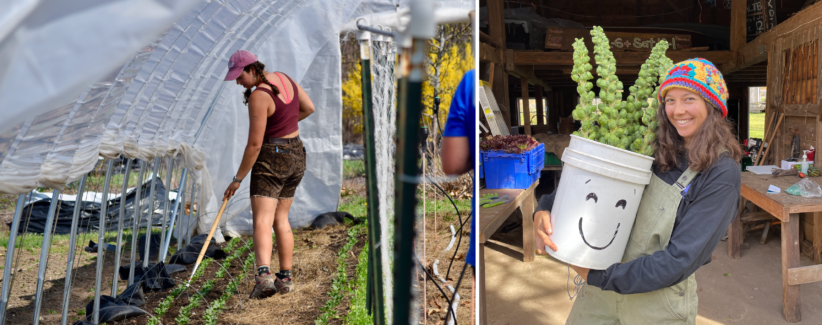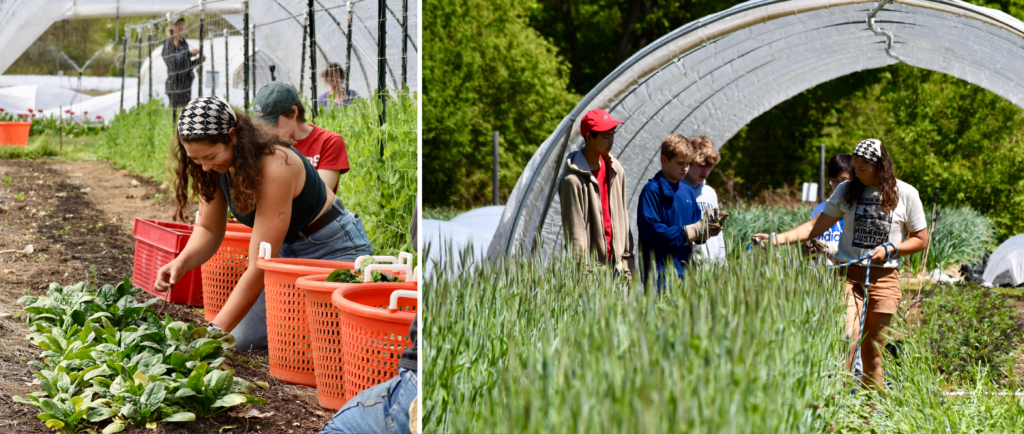Farmer Spotlight: Maddie Weikel

This month’s newsletter offers us a great opportunity to check in with Assistant Grower and Assistant Volunteer Leader Maddie Weikel, who now has a couple months with us under her belt. We’re grateful to have Maddie on the team for the 2023 season, and to introduce her to the whole Gaining Ground community.
Where is home? How did you find your way to Gaining Ground?
I grew up in Ohio, but moved in with my parents in the Boston area when the pandemic began because I was finishing my final semester of college in the spring of 2020.
A bit out of the blue, I started farming as a regular volunteer at Saltbox Farm in Concord that summer. I was deeply yearning to be away from screens and with other people, and was so grateful to connect with the folks doing amazing work in the fields over there. Growing up in a Midwestern suburb, I didn’t really know what a community farm was. My concept of “farming” as a profession was dominated by the fields of corn and cows that I drove past on my way to school each day.
Upon moving to the area, I quickly learned that the small-scale, organic vegetable farming community here is so rich! And because I was able to live comfortably with my parents (for free) for a couple years, I was able to gain some entry-level growing experience and get to know the farming scene as a volunteer, which allowed for a seamless transition into paid farm work. This was essential to my farming journey. In other circumstances, I likely wouldn’t have been able to afford to farm straight out of college, which speaks to the general inaccessibility of the craft and the barriers that many young (and also not young) farmers face.
After a few seasons at Saltbox, I was eager to be rehomed at Gaining Ground—a larger-scale, more established no-till farm with a rich culture of collaboration and community. I feel wonderfully fortunate to get to build my farming education and experience at an organization that is able to meet the needs of its farmers and truly support the work of growing food, neither of which is a given. I am eager to continue building my love for farming as well as my technical farming skills while engaging with the complexities of growing food well for hunger relief by relying on a nonprofit model and such a broad volunteer base—both of which are resources that many farms don’t have access to. So far, getting to know the life and the land at Gaining Ground has been a great gift, and I’m excited to move with the flow of the season’s energy as crops, volunteers, and warmer weather ramp up!

Do you have any favorite farmers or other folks doing work that personally motivates or inspires you?
Yes! First, I will mention my mentor and friend, Mark Congdon, who guided me through his apprenticeship program at Saltbox Farm. He now farms in Hopkinton at Honeynut Farm. bringing with him immeasurable wisdom about the technicalities of growing food and about our role as humans tangled up in all the life and energies of the world. If you’re in the area, definitely check out Honeynut—big things are in the works!
Rock Steady Farm in Millerton, New York, is doing some pretty rad experimentation with cooperative farming, and the Greenhorns in Maine are an inspiration in radical knowledge sharing, rich community collaboration, and beautiful support for young farmers trying to have a hand in building a better food system. The Greenhorns’ New Farmer’s Almanac is such a fun, ever-evolving resource! Similarly, the Agrarian Land Trust is doing tangibly impactful work in land access. Farm2Power is a mutual aid collective based in the Los Angeles area that buys produce from Black, Indigenous, and People of Color-led farms and distributes that produce to community members for free.
My relationship to farming is ever-metamorphosing alongside and intertwined with the idea that creating a more beautiful world is a dual project of dismantling and rebuilding, which is an idea I first learned from abolitionist organizer Mariame Kaba. Here are some groups that I personally look up to as incredible organizers that act according to an impassioned recipe of love, rage, and hope:
- Families for Justice as Healing (FJAH) is a group based in Roxbury and led by formerly incarcerated women fighting to end the incarceration of women and girls in Massachusetts. They have been leading an incredible campaign to stop the construction of a new women’s prison in the state, and also are instrumental in supporting people as they are freed from prison and jail and welcomed back into the community. They are also in the process of launching a hydroponic farm!
- Community members in Cambridge and the Greater Boston area, led by the Boston Party for Socialism and Liberation, have been mobilizing since February to hold the Cambridge Police Department and Cambridge City Council accountable to the murder of Arif Sayed Faisal, a Bangladeshi UMass Boston student who was killed by Cambridge police in January of this year. This campaign is an example of the great potential of “people power,” a central value for any of us trying to transform our communities, whether that be through holding government officials accountable to their word, or through reimagining how we can strengthen local food systems.
- The Stop Cop City / Defend the Atlanta Forest movement is another demonstration of “people power” and of not waiting for permission to create the world where we feel safe and loved. I am so grateful to be able to farm at a place as special as Gaining Ground. In turn, the responsibility to stand in solidarity with people protecting land that is sacred (and instrumental for public health!) elsewhere feels particularly salient to me. I also very much recommend checking out this piece by an Atlanta-based foraging collective called Common Abundance for some wisdom on reimagining our relationships to food and land.
- As mentioned above, our dominant industrialized, globalized food system has always and continues to rely foundationally on exploitation, particularly labor exploitation. Migrant Justice is a Vermont-based group that organizes to protect migrant farmworkers in the US, who are both systematically vulnerable to abuse and essential to our food system as it exists today. Their current campaign, Milk with Dignity, employs the strategy of worker-driven social responsibility to hold corporations accountable to the people who milk the cows and process the products that bring in profits. On a broader scale, folks in southern Arizona working with No More Deaths support people on their journeys from down south through the Sonoran Desert. There is certainly overlap between folks who cross the US-Mexico border outside of official checkpoints and the people who scaffold the US food system. My relationship to farming as a land stewardship practice (and my relationship to spending so much time outside in the sun!) is greatly informed by the radically care-full, heartbreaking, and tender mutual aid work that No More Deaths embodies.
- Lastly, for all my fellow Jewish people who find awe and joy in communing with soil, check out Dori Midnight for some wonderful teachings linking Judaism and queerness with the juiciness of being alive amongst so much beauty and also so much to be mended. The Jewish Farmer Network also offers many resources, classes, and events about our history as people of the land and all that ever-evolving Jewish tradition has to offer to a farming practice.
What is one of your favorite dishes or recipes?
Last growing season, I had a pretty constant flow of fennel, sungold tomato, and artichoke salad throughout the summer and early fall. Throw the fennel and sungolds in the oven until the tomatoes burst, and put them over orzo with some artichoke hearts.
My housemates and I have also been trying to make our own hummus in bulk to reduce how much plastic we consume, and I’m excited to add more flavors to the mix as more herbs and vegetables become ready for harvest!
If you see me around the farm, definitely share any ideas for what treats from the fields I should try.